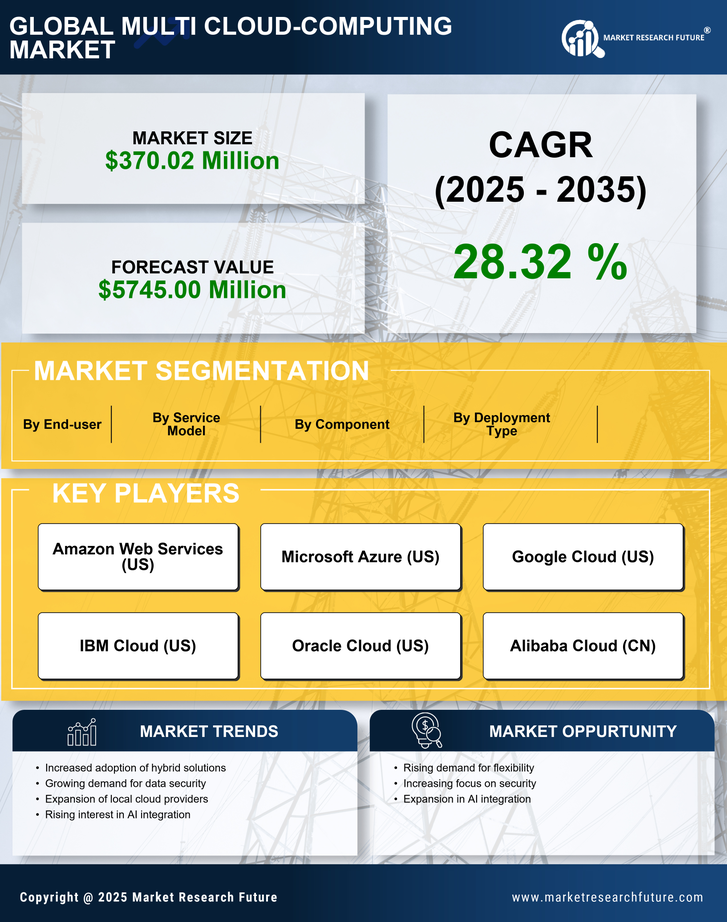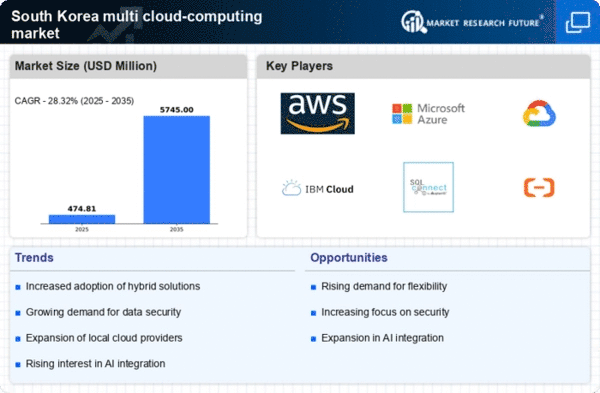Growing Demand for Scalability
the multi cloud-computing market in South Korea experienced a notable surge in demand for scalable solutions.. Organizations are increasingly seeking the flexibility to adjust their computing resources based on fluctuating workloads. This trend is driven by the need for businesses to remain agile in a competitive landscape. According to recent data, approximately 70% of enterprises in South Korea are prioritizing scalability in their cloud strategies. This growing emphasis on scalability is likely to propel the multi cloud-computing market forward, as companies recognize the importance of adapting to changing business needs without incurring excessive costs. Furthermore, the ability to seamlessly integrate multiple cloud services enhances operational efficiency, making scalability a critical driver in the multi cloud-computing market.
Rising Interest in Cost Optimization
Cost optimization is emerging as a pivotal driver in the multi cloud-computing market within South Korea. Organizations are actively seeking ways to reduce their IT expenditures while maximizing the value derived from cloud services. The competitive nature of the market compels businesses to explore multi cloud strategies that allow for cost-effective resource allocation. Recent surveys indicate that around 75% of South Korean enterprises are focusing on optimizing their cloud spending. This trend is likely to foster growth in the multi cloud-computing market, as companies leverage the strengths of different cloud providers to achieve better pricing models and service offerings. The potential for significant cost savings through strategic cloud management is a compelling incentive for businesses.
Increased Collaboration and Innovation
The multi cloud-computing market in South Korea is benefiting from a surge in collaboration and innovation among technology providers. As companies seek to enhance their cloud capabilities, partnerships between cloud service providers and enterprises are becoming more prevalent. This collaborative approach fosters the development of innovative solutions tailored to specific industry needs. Approximately 55% of South Korean businesses report that collaboration with cloud vendors has led to improved service offerings. This trend is likely to drive the multi cloud-computing market forward, as organizations leverage the expertise of multiple providers to create customized solutions that enhance operational efficiency. The emphasis on innovation through collaboration is expected to play a crucial role in shaping the future landscape of the multi cloud-computing market.
Regulatory Compliance and Data Sovereignty
the multi cloud-computing market in South Korea was significantly influenced by regulatory compliance and data sovereignty concerns.. As data protection laws become more stringent, organizations are compelled to adopt cloud solutions that align with local regulations. This is particularly relevant in sectors such as finance and healthcare, where compliance is paramount. Approximately 65% of companies in South Korea report that regulatory requirements are a key factor in their cloud adoption strategies. This driver is likely to shape the multi cloud-computing market, as businesses seek to leverage multiple cloud providers to ensure compliance while optimizing their operations. The ability to manage data across various jurisdictions while adhering to local laws is becoming increasingly critical.
Enhanced Focus on Disaster Recovery Solutions
In South Korea, the multi cloud-computing market is witnessing an increased emphasis on disaster recovery solutions. Organizations are becoming more aware of the potential risks associated with data loss and system failures. As a result, many are investing in multi cloud strategies that provide robust backup and recovery options. Recent statistics indicate that nearly 60% of South Korean businesses consider disaster recovery a top priority in their IT planning. This heightened focus on resilience and continuity is likely to drive growth in the multi cloud-computing market, as companies seek to ensure their operations remain uninterrupted in the face of unforeseen challenges. The integration of diverse cloud environments allows for more effective disaster recovery strategies, further solidifying this driver’s importance.

















